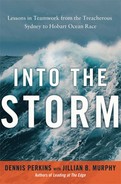2
![]()
The Patriarch of a Sailing Family
Bill Psaltis started sailing just about the time of the first Sydney to Hobart Race. In those days the Cruising Yacht Club of Australia was little more than one in a row of boat sheds and fishing shanties. Bill kept a small boat about two sheds down from the club.
Bill was an inquisitive guy with an accounting background, and he became interested in the Club's finances. At an annual meeting, he pointed out that the Club had more liabilities than assets. Faced with a problem that no one wanted to touch, one of the sailors commented, “All right, wise guy, why don't you be the treasurer?” And with that, Bill Psaltis became Treasurer of the Cruising Yacht Club of Australia at age 22.
The promotion got Bill closer to offshore ocean racing, and—in his first Hobart in 1956—Bill's boat came in second. Bill Psaltis had caught the disease.
I enjoyed it. It motivated me. And apart from the pleasure of being at sea and seeing the sunrise and the sunset, there's that feel that you're achieving something. Comradeship was marvelous in those days.
Four years after that, Bill was sailing on a 54-foot boat—a pretty big vessel for a thirty-year-old. His passion for sailing continued unabated, and he had his eyes set on becoming Commodore of the Cruising Yacht Club of Australia.
In keeping with tradition, becoming Commodore meant that you needed to sail your own boat to Hobart. So Bill bought a famous ocean racing boat called Lass O'Luss and sailed her for a number of years in the Hobart. Bill developed his skills as a sailor, and his leadership aspirations were realized as well: Accountant Psaltis became Commodore Psaltis.
It's not surprising that Bill's passion for sailing infected his three boys. Every Friday, Bill would be home from work by 5:30 in the evening. Then he, his wife, Margaret, and their three boys were off to spend most of the weekend on the boat.
There were cruises up and down the coast with the Royal Sydney Yacht Squadron. The Psaltis family was in the advanced Spinnaker division, restricted to those who would use the big parachute-like sails to catch the wind from behind. The boys were young—10, 8, and 6—but they were capable, and they learned quickly.
All three boys sailed, but Ed and Arthur seemed especially committed to the sport. Bill recalled:
I've got photos of Edward as a little boy and he's always holding a boat. He was always into boats, and Arthur tagged along. It's hard to remember, but looking at the photos, Ed is always sitting next to me on the boat, wherever it may be.
Though he loved sailing, Bill's passion for the sport was almost extinguished in 1968. Sailing in a Hobart race he thought couldn't have been any worse, Bill suddenly found himself in the water, gasping for air, with his boat capsized over him. He remembers praying to God and saying: If I ever escape this and get out with my life, I will never sail again. When he got back, he sold Lass O'Luss. He had had enough. He would never go sailing again.
That resolve lasted for about a year—until Bill decided to find a boat that could take anything. He spent a week in the United States at Sparkman & Stephens, a famous yacht design firm. Working with top designers, Bill was intent on creating a boat that would be unsinkable—absolutely unsinkable. It had to be able to right itself. It couldn't let water in. And it had to win the Hobart race.
The boatbuilders were good, but they weren't magicians. Bill still has a copy of the letter he received with the discouraging news: “You want the boat to win and you want it to be unsinkable. You can have one or the other, but we can't promise both. Which do you want?”
Shivering at the memory of his brush with death in the Bass Strait, he answered without hesitation. Given the choice, Bill Psaltis wanted to be certain that he would come home on an unsinkable boat. And that's exactly what he got.
Bill got a very good, solid boat named Meltemi, after the Greek wind. According to mythology, Meltemi is controlled by Boreas, the god of the North Wind. It blows from the north and sweeps across Greek waters, sometimes swamping small craft and wreaking havoc along the beaches. Meltemi was a good racing boat, and Bill did well. He came in second in his division, but he never won the Hobart race. He took away something even more important than a trophy:
The Hobart taught me when things are hardest, that's when you work hardest. When things are easy, you don't take it easy, you think about the next thing you're going to have to do and work it all out before it happens.1
Bill Psaltis retired from racing after twenty-three Hobarts, but the story of the Psaltis family was not over. It was, in fact, just beginning.
